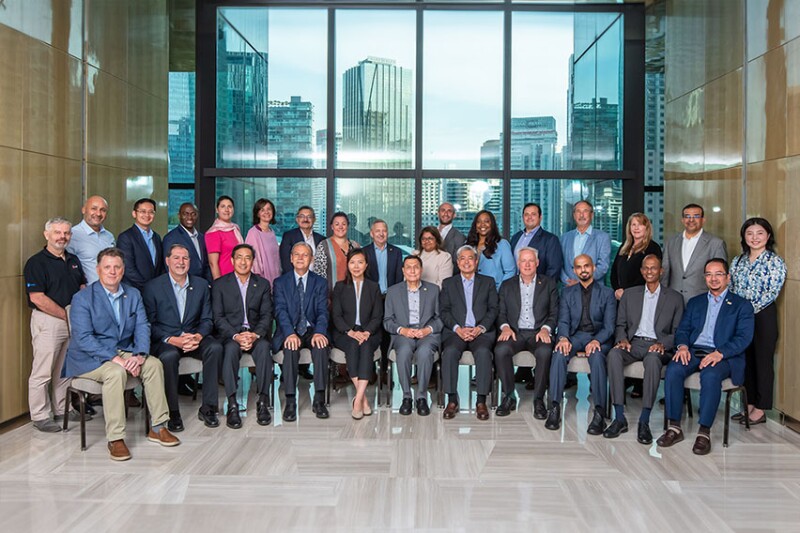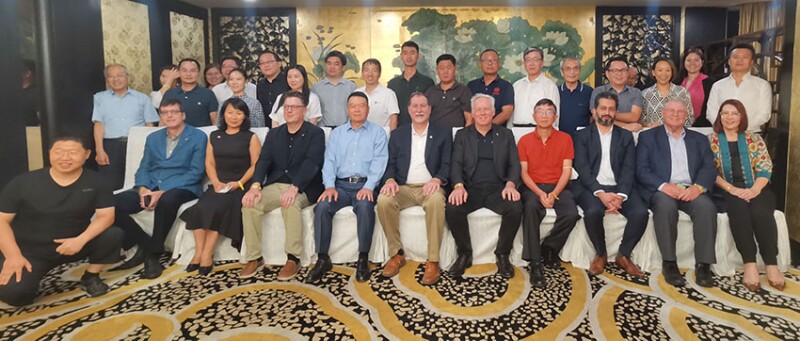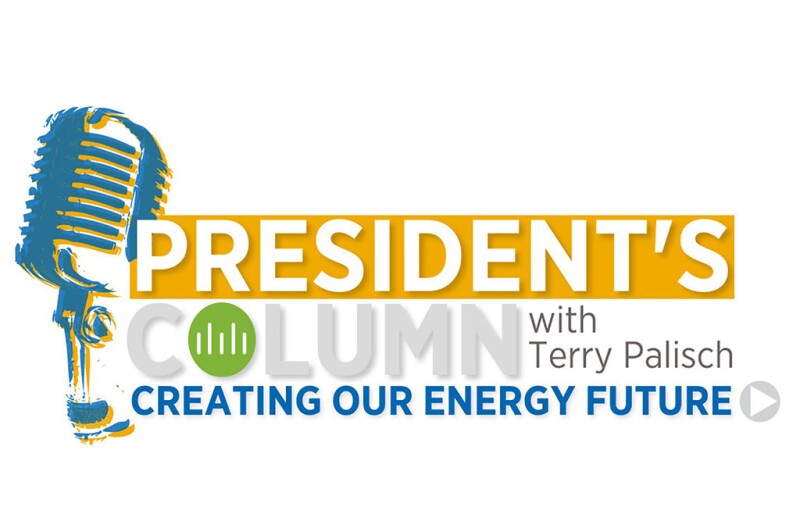In this podcast episode and transcript, Terry Palisch shares his thoughts about how SPE and its members fit into the energy transition and what it means for our energy future.
Welcome to the Society of Petroleum Engineers podcast with the 2024 SPE President Terry Palisch. I’m Paige McCown, senior manager of communication and energy education at SPE. Today I will be talking with Terry about his thoughts on how SPE and its members fit into the energy transition and what it means for our energy future.
Before we dig into the topic today, I know SPE has a board meeting this month at the Annual Technical Conference and Exhibition (ATCE) in San Antonio. Can you tell us a bit more about the goals for this meeting?
Let me start by talking about the format. The board meets officially meets four times a year, including once a year at ATCE. We meet twice a year at strategically planned locations chosen by the president and then we meet once virtually in January.
We look to support the region or the section and local companies. This spring we were in Dhahran, Saudi Arabia, and then Kuala Lumpur this summer. That was the first time we visited the Middle East and Asia Pacific in several years, so getting back to those regions and meeting with local leaders was important.
As far as the goals for the meetings, we typically have 2 full days of committee meetings. We have some minor committees as well as two primary committees: technical content, and membership and engagement. The goal is to work with senior staff to see how we are performing relative to our strategies, setting strategies, and understanding where we are headed.
When we met in Kuala Lumpur in July, our two primary committees spent at least half of the time discussing the new strategic plan and developing action items to help make sure that we continue to meet our members’ and our constituencies’ needs.
For example, and we’ll be talking about it again at the meeting at ATCE in San Antonio, the technical content committee’s primary questions are how do we continue to evolve our event formats and how do we stay up to date and implement new technologies so that we can continue to meet our attendees’, exhibitors’, and sponsors’ expectations and provide value. We have a workgroup in place to answer this, but overall, it’s a fairly intense 3 days of meetings along with meetings with local companies and local leaders.
That’s great, I know those are pretty intense and you do a lot of work towards it. You mentioned that the board tries to be strategic and support the local regions. Can you elaborate on that?
Sure, probably the easiest is to give you some examples. Last summer we were in Amsterdam and met with Shell and toured their Shell Energy Transition Center to see what they were doing. At ATCE in Houston last fall we met with ExxonMobil executives, discussed their activities, and toured their Spring, Texas, campus and labs. In Dhahran, we toured the Aramco Shaybah field and the Empty Quarter (a vast stretch of unbroken sand desert in Saudi Arabia). We visited their technology center and also engaged with the local leaders.
In Kuala Lumpur in July, we hosted a panel discussion with the Asia Pacific Advisory Council. We have several councils across the world. This council is very active in the region and is led by Datuk Adif Zulkifli, executive vice president of Petronas. He was joined in this panel by executives from ExxonMobil, Shell, Hess, SLB, and Pertamina. They relayed to us just how important it is for operators in the region to bring energy to the local area, particularly natural gas, but also the importance of what they are doing to decarbonize their operations. It was a great discussion, and it was great to meet the local leaders and support them. I can’t thank Petronas enough for the hospitality and for hosting this discussion.
I think it’s really important for the SPE Board to be involved in the regions and I think our members appreciate our involvement where they work and the companies that employ them.
Recently I read an article on the JPT website that you led a delegation to Beijing for a week of meetings. I know that’s an important region for our members. Can you tell us about the purpose?
Absolutely. SPE first entered China in 1979. Today we have six sections, 14 student chapters, and a good presence there. Since we were in the region for the board meeting in Kuala Lumpur, we decided to take a delegation to China. We had a group made up of a couple of board members as well as senior SPE staff.
The primary purpose was to meet with the leadership of the NOCs and to reengage after the COVID-19 pandemic. It was the first time we had been back and wanted to hear their concerns, what they are working on, and how SPE can help.
It was a great week. We met with several high‑level delegations from China National Petroleum Corporation (CNPC), China Petroleum & Chemical Corporation (Sinopec), China National Offshore Oil Company (CNOOC), Research Institute of Petroleum and Exploration (RIPED), and we met with Aramco Asia and toured their lab.
We culminated with a face-to-face meeting with Hou Qijun, president of CNPC. He was a gracious host; he not only took time out of his busy schedule to meet with us but was also our host when we arrived in China. I will say this, in all cases, we heard how important it is for the NOCs to bring energy to China in all forms, but in particular, they want to continue to grow their oil and natural gas reserves and production to meet the needs of China’s growing economy.
They see the need for technology. China has always been big in EOR (enhanced oil recovery) and they continue to see new technologies there. They are looking at developing their unconventional resources and continuing to look at offshore growth, but in addition to those energy supply concerns, they are looking into CCUS (carbon capture, utilization, and storage) to lower their carbon footprint.
This is one of the reasons we are having a CCUS workshop next spring in China. They were very pleased to hear that we were leading that. I will say that all the leaders that we met with are very appreciative of the Society of Petroleum Engineers. They see SPE as the ideal mechanism for disseminating information to help them develop new technologies by providing a platform for innovative collaboration at the local level as well as across the globe. It was a great visit, and it was really good to meet the leaders; I’m excited about where we are headed in China.

That does sound very exciting. I know it’s a very important region, thank you for those updates. Our members are always curious about how the board works. We look forward to monthly updates in your podcast episodes.
Let’s get to our topic. In your September podcast episode, you mentioned your presidential theme ‘Creating Our Energy Future.’ What is our energy future in the context of today’s energy transition environment?
I recently attended SPE’s inaugural Energy Transition Symposium, a 2-day symposium that included panel sessions, executive discussions, keynotes, and technical papers. It was a great event. It brought together a mix of almost 200 engineers, scientists, managers, and executives from all walks of life both in our industry as well as outside. We had many nonmembers, and there were many attendees who were new to an SPE event, and they all came together to discuss our industry’s role in the energy transition.
There were several themes that came out of the symposium. One overarching theme was that the world is going to need increasing amounts of energy. We have a growing population, we have developing countries, and there is a general agreement that oil and gas will be needed to meet these demands. How much oil and gas is debatable, but there are tremendous needs for oil and gas in the future. Another thing that came out is carbon capture and storage (CCS) is going to be critical to reducing CO2 emissions.
We also heard that there is really no transition without the engineers and scientists in their industry, and that was a key theme for us. I just want to say that again: There is no transition without the engineers and scientists in our industry.
Why is that? Because we need to not only grow our oil and gas production but also, we are critical to reducing CO2 emissions through CCS and other decarbonization of our operations. For those in our industry, our future is very bright based on what I heard, whether it’s to continue finding innovative ways to recover more hydrocarbons, to use our petroleum engineering skills to grow CCS and geothermal, or just to flat-out reduce the carbon footprint of our operations like we’re doing now. The key to our energy future will be technology and collaboration, the key theme that came out at the end of the symposium in Houston.

That’s a great key message and I think a lot of our members, our younger members and our student members, are concerned about that. So, based on what you learned and what you know, how do petroleum engineers and our members create their energy future in this context?
Well as I said before, the world is going to need more oil and gas, and to be able to produce additional oil and natural gas, we are going to need to continue advancing the technologies we are working with today. Those technologies in all aspects of our disciplines, whether it’s drilling, completions, formation evaluation, production, or reservoir. They are all critical, and we know that without technology we won’t be able to meet those needs.
“There is no (energy) transition without the engineers and scientists in our industry.”
We are also needed, both petroleum engineers and our industry, for decarbonization efforts. I mentioned them before. We are well suited to help make geothermal energy economical, drilling, completion, and reservoir all are important, and of course, CCS, which is critical and right in our wheelhouse, petroleum engineers can participate in that. We have methane emissions reduction, flare reduction, and things like that.
It’s important to our future that we develop technologies that not only increase oil and gas reserves but also reduce our environmental footprint. I think about safety and how safety has become a part of our culture, and so has sustainability and the environment. We are doing that as we speak. I think companies are embracing that and petroleum engineers are embracing that.
The thing to keep in mind is that technology changes fast. It is changing even quicker as we go into the future and members must engage in the practice of lifelong learning. If they do that, they can create their energy future in any context they desire within the energy spectrum.
You mentioned it just a second ago about engaging in lifelong learning, how more can SPE help its members create their energy future?
Let me first say that SPE exists to serve its members and their companies, to help them advance their technical skills in their professional competencies and their jobs. Just as I’ve talked about the gym membership analogy, this is to help your professional side. No matter what the future holds, SPE will continue to meet the diverse regional needs of all our members across the globe.
Our members come from all aspects of the business: oil and gas development, sustainability, and related energies. Our industry, and our members, are uniquely positioned to solve the three-way challenge of providing affordable, secure, and decarbonized energy to the world. We are going to need tremendous advancements in oil and gas recovery, as I mentioned before, to meet the energy demand, and we’re also going to need expertise in decarbonizing our operations.
To accomplish this need for lifelong learning, SPE members need to continue to build their technical competence, whether they are reading papers or attending conferences, workshops, or training, but they are also going to need to collaborate.
There are obviously plenty of opportunities provided by SPE Connect or joining one of our 22 technical sections, whether it be petroleum engineering-related like the Hydraulic Fracturing Technical Section, or some of the newer ones like Geothermal, CCUS, or Hydrogen. In the end, by exercising the benefits and offerings of SPE in these areas, you can create your energy future and SPE will be there to provide those.
What would you say if you could talk directly to our young members about this? What would be your advice or what would you tell them?
I visited many sections and student chapters and one thing I can say is the young members are all excited about our industry, and the seasoned members are as well. They all want to be part of the solution to providing affordable, secure, decarbonized energy to the world. They all want to be doing something that is meaningful, and I think they are excited about it.
We need to remember that it is going to take the best and the brightest minds to solve this, so those of you who are looking at our industry, or are students, or new to the industry, you are the future, and you are going to be bringing these new technologies.
I want to encourage everyone to take advantage of SPE to increase their technical knowledge and expertise as well as to collaborate and work with their peers. This is how you will advance your career, and this will allow all of us to create our energy future.
I would also like to take a moment to encourage everyone to go out and get at least one (new) SPE member, how about making that a goal? By adding to our membership, it will improve our knowledge base, improve our ability to collaborate, and ultimately, it will improve our professional competencies.
SPE is going to continue to evolve to be a part of a sustainable energy future and ensure careers for future generations.
That is a positive message and I think a lot of people will be happy to hear you say that. Terry, what’s on tap for next month’s podcast episode?
I think we are going to dive a little bit deeper into some of the new technology and collaboration needed for the future of oil and gas, and how your membership, our global membership, helps improve the technical competencies.
We will dive a little bit deeper into how SPE is delivering technical content and some of the things we are looking at in the future, as well as how we provide networking opportunities to our members to help with what some have called the energy trilemma. I like to call it the energy opportunity. It is the energy opportunity for us, and it is the opportunity for us to create our energy future.
Thank you for giving us a glimpse into your thoughts on the energy transition and how our members fit into it. I know it’s a big topic of conversation and it sounds like we will be continuing this topic in episodes to come.
Terry will be doing monthly podcasts, and you can find each episode with transcripts on the 1st of every month on SPE’s JPT website and in the monthly digital edition of JPT. Previous months’ episodes can also be found on SPE’s Energy Stream.


